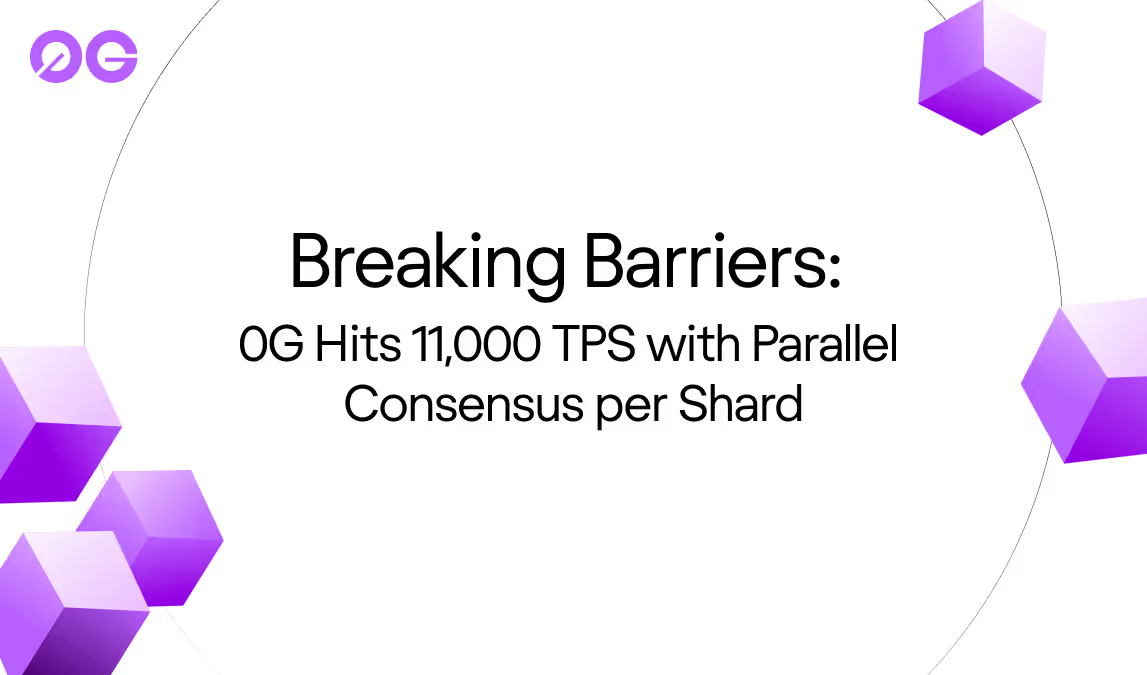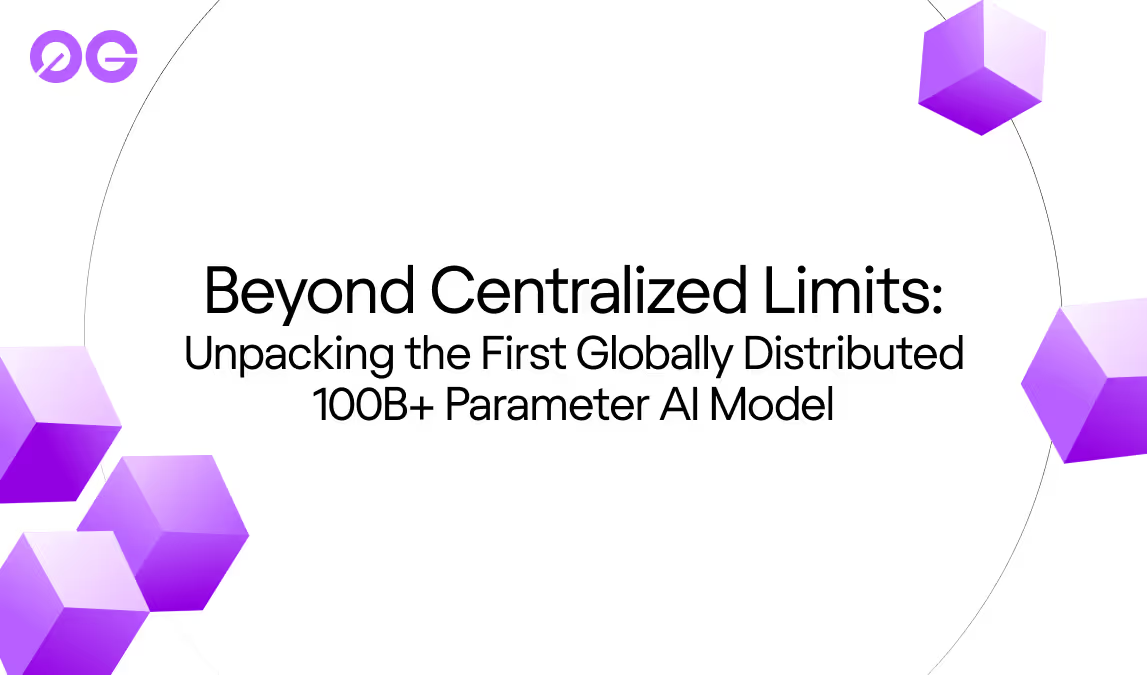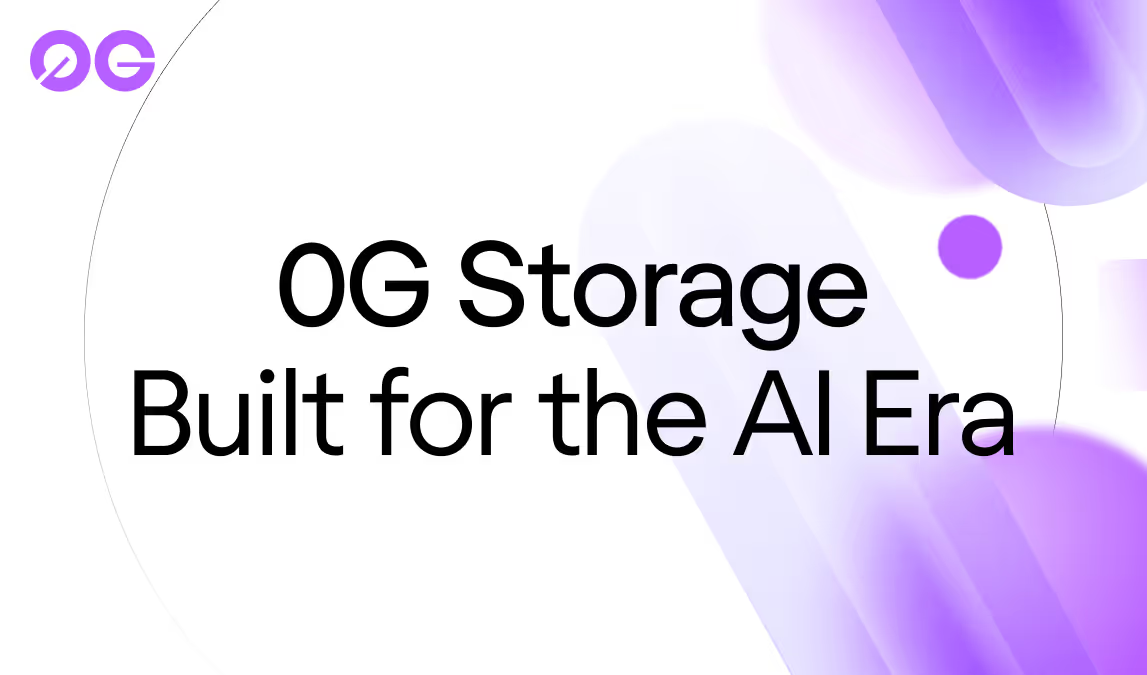

Breaking Barriers: 0G, the Largest, Infinitely Scalable AI Layer 1, Hits 11,000 TPS with Parallel Consensus per Shard
At Zero Gravity Labs, we’re building the foundation for decentralized AI through infrastructure that delivers Ethereum-grade security and limitless scale (infinite TPS and data throughput). This month, we validated that vision with a breakthrough milestone.
0G has achieved 11,000 transactions per second (TPS) per shard across 50 distributed validators, with an average block time of just 500 milliseconds.
This deployment ran across multi-cloud, geographically distributed nodes connected with dedicated 100 mbps links, showcasing 0G’s resilience under real-world conditions. And because our architecture scales linearly with additional shards, throughput is infinite, with capacity expanding as demand grows.
11,000 TPS per Shard Is Just the Start
Numbers alone don’t tell the full story. Hitting 11,000 TPS per shard is impressive, but the bottom line is 0G’s design enables infinite TPS via parallel consensus. And ultimately, what really matters is how this breakthrough reshapes the boundaries of blockchain performance, scalability, and real-world usability.
Here are four reasons this milestone matters for the future of decentralized AI and beyond:
- Massive Performance Leap: 0G now far surpasses the capacity of most existing blockchains, putting us firmly in the category of high-performance, real-world scalable chains.
- Breakthrough Consensus Innovation: This achievement was made possible by a new parallel consensus workflow that removes the sequential bottleneck of payload execution.
- Enterprise-Ready Infrastructure: The milestone was validated across multi-cloud, geographically distributed nodes. This demonstrates 0G’s ability to operate effectively under real-world, enterprise-grade conditions.
- Next-Gen Block Capacity: 0G now operates with a 120M gas limit per block, one of the highest in the industry. Combined with parallel execution, 0G can now handle AI-scale, data-intensive workloads without compromising security or throughput.
Escaping the Execution Trap
Traditional Ethereum-style consensus requires validators to re-execute every transaction in sequence before finalizing a block. This design ensures security but creates redundant computation and limits throughput.
Zero Gravity removes this bottleneck by introducing a parallel execution workflow. Here’s how it works:
- Dummy State Root Propagation: Proposers and validators propagate blocks using a placeholder (dummy) state root, allowing transactions to move quickly through the network without waiting for full execution.
- Parallel Execution: Transactions are executed in parallel by proposers and validators, eliminating the sequential choke point.
- Validator Security Guarantees: Even with parallelism, validators still perform full state checks before finalization, maintaining the same security guarantees as Ethereum.
Together, these innovations eliminate redundant computation while preserving decentralization and trust. The result is unprecedented throughput without any security compromises.
Scaling for AI and Data-Heavy Workloads
The latest benchmark not only demonstrated raw throughput, but also validated 0G’s ability to sustain AI-scale operations under real-world conditions. By combining parallel consensus with shard-based scaling, aggregate throughput increases linearly as the number of shards increases, effectively enabling infinite scale.
This architecture unlocks several critical capabilities for AI and beyond:
- Model Training and Inference: 0G now has the bandwidth required for onchain fine-tuning, inference requests, and model coordination at speeds impossible on sequential consensus systems.
- Dataset Verification at Scale: Large datasets can be ingested, hashed, and validated across multiple shards without creating bottlenecks, ensuring verifiable provenance for AI data pipelines.
- Diverse Agentic Ecosystems: Shard-based scaling allows thousands of tokenized agents to execute economic transactions, inference calls, and coordination tasks in parallel.
- High-Volume Applications: 0G can now support high-frequency, high-volume user activities such as automated agentic trading and in-game transactions, which often demand thousands of concurrent state updates per second.
In short, 0G has proven that intensive AI workloads and other computationally demanding applications can be effectively deployed and scaled onchain.
Onward to Infinite Scale
At Zero Gravity Labs, we’ve always believed that the future of decentralized AI requires an entirely new class of infrastructure — one that combines Ethereum-level security with infinite performance scale. With this recent achievement, we’ve shown what that future looks like in practice.
Ultimately, our goal is to achieve 100,000 TPS per shard and 50ms block finality, creating an environment where even the most complex decentralized AI can operate without limits. Beyond raw throughput, the future of AI-native infrastructure demands systems powerful enough to carry the next generation of decentralized applications forward. And with this latest milestone, Zero Gravity has shown it’s possible.






